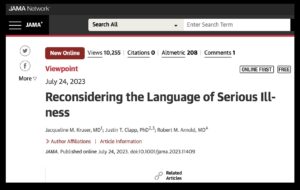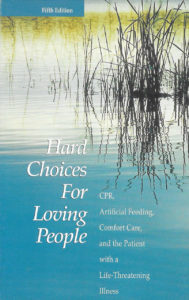The ethics committee turned to me, “Chaplain Dunn, we will have you talk to all the patients and families about ‘No CPR’ orders and advance directives.” I was just six months into a part-time chaplain’s position for which I had no training. The arc of my career was set for the next forty years in this one assignment.
Four decades later, I am still learning our words matter.
“Need” implies you have no choice
 I read a recent JAMA Online article titled “Reconsidering the Language of Serious Illness,” which illustrates that when healthcare professionals use the word “need,” aggressive treatment is often the result. Example statements from the article:
I read a recent JAMA Online article titled “Reconsidering the Language of Serious Illness,” which illustrates that when healthcare professionals use the word “need,” aggressive treatment is often the result. Example statements from the article:
- “If her breathing gets any worse, she will need to be intubated.”
- “He needs a central line, a special IV catheter in his neck, so we can give him blood pressure medicines.”
- “If she doesn’t make any urine soon, she will need dialysis.”
- “If she can’t be extubated soon, she will need a trach.”
The article’s authors argue that once you say the word “need,” it implies that the family has no choice but to proceed with the treatment. Who would deny their mother what she NEEDS?
“To need is to lack something essential”
From the article: “To need is to lack something essential. As clinicians, we regularly use the word need to think about and describe the condition of patients with acute serious illness. These patients lack something essential for survival, and clinicians have the technologies and therapies to sustain their lives. So need rolls off our tongues as a shorthand to convey our clinical assessments of patients with acute life-threatening illness.”
Their suggestion for changing the language: “When a patient is facing a life-threatening illness, instead of saying she ‘needs to be intubated,’ we suggest that clinicians say, ‘Her illness is getting worse. I would like to talk with you about what this means and what to do next.’”
This language change opens the conversation up to more options than just “the need to be intubated.” What does the patient think about their current situation? What are her preferences about being kept alive on a machine? What are her chances that she will ever get off the vent? Intubation is one possible choice, but others are equally possible, including shifting the focus from cure to comfort.
 Changing “What does the patient WANT?” to “What does the patient THINK…”
Changing “What does the patient WANT?” to “What does the patient THINK…”
Six years ago, I made a significant change in the language in one sentence in my Hard Choices for Loving People book. Once again, a medical journal article convinced me to change a question I had used for almost three decades. I wrote about this in a previous blog, “You Can’t Get What You Want.”
Since the first edition of Hard Choices in 1990, I have included “What does the patient want?” as one of five questions to ask as an aid to making end-of-life decisions. In 2017, I changed it to: “What does the patient think about their current and probable future condition?”
A career using language to help with end-of-life decisions
 Soon after I became a part-time nursing home chaplain in 1983, our administration formed an ethics committee. Virginia had just passed a “Natural Death Act,” which gave patients a right in the code to refuse treatment and provided a form (e.g., “living will”) to express their treatment preferences.
Soon after I became a part-time nursing home chaplain in 1983, our administration formed an ethics committee. Virginia had just passed a “Natural Death Act,” which gave patients a right in the code to refuse treatment and provided a form (e.g., “living will”) to express their treatment preferences.
The committee included the director of nursing, the medical director, a lawyer, an administrator, and me. In response to the new law, our plan was to inform all patients and their families about advance directives and the option of a “No CPR” order. But who would deliver the information?
The committee turned to me, “Chaplain Dunn, we will have you talk to all the patients and families about ‘No CPR’ orders and advance directives.” I had no healthcare experience and had yet to take basic chaplain training. So, I learned how to talk to patients and families…by talking to patients and families
Over the next year, we went from less than 10% of our patients having an advance directive and/or “No CPR” order to over 80%. And I learned the importance of using my words to help the process along.
We published the first edition of Hard Choices for Loving People seven years later.
[Cover Photo by Kampus Production via Pexels]
________________________
Chaplain Hank Dunn is the author of Hard Choices for Loving People: CPR, Feeding Tubes, Palliative Care, Comfort Measures and the Patient with a Serious Illness and Light in the Shadows. Together they have sold over 4 million copies. You can purchase his books at hankdunn.com or on Amazon.





